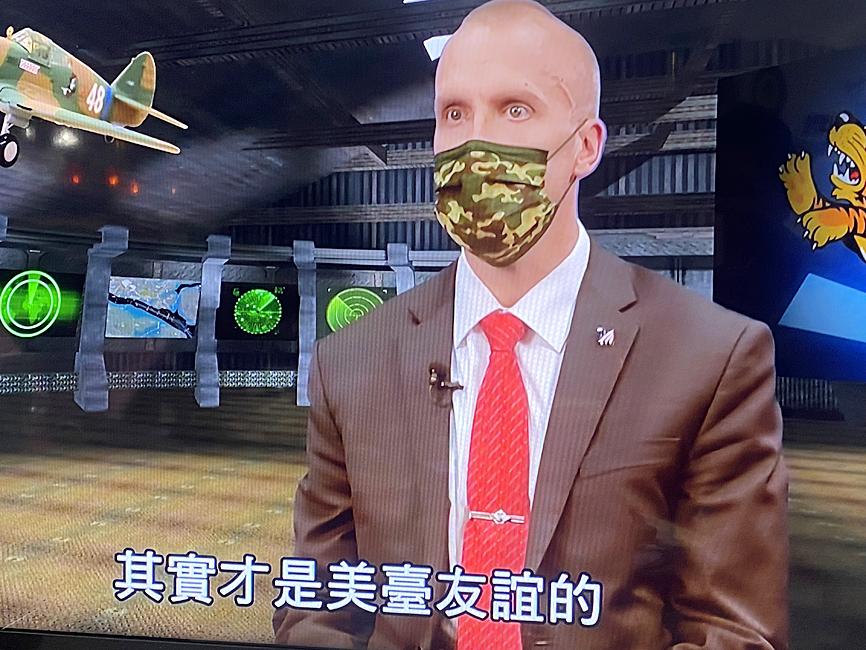A US military officer on Thursday appeared on a Ministry of National Defense TV program for the first time since the countries severed diplomatic ties more than four decades ago.
US Army Colonel Brady Crosier, who heads the security cooperation office at the American Institute in Taiwan, was interviewed on Lu-Kang Garden (莒光園地) in a segment marking the 80th anniversary of the First American Volunteer Group of the Republic of China, also known as the Flying Tigers.
The Flying Tigers was a Republic of China Air Force unit comprised of US pilots that fought Japan in China and Southeast Asia in 1941 and 1942.

Screen grab by Wu Shu-wei, Taipei Times
Crosier, who spoke in Mandarin throughout the segment, said the storied fighter unit is a testament to the long history of US-Taiwan security cooperation, based on the shared values of democracy and friendship.
Taiwan and the US continue to work closely on security matters, humanitarian aid and disaster relief, he said, adding that the US conducted search-and-rescue missions in Taiwan during Typhoon Morakot in 2009.
Kuo Yu-jen (郭育仁), a professor at National Sun Yat-sen University’s Institute of China and Asia-Pacific Studies, said that Crozier’s appearance was intended to reassure rank-and-file members of Taiwan’s military that the US is a friend.
The US began normalizing military exchanges with Taiwan under former US president Donald Trump, and trends suggest that US President Joe Biden would continue this policy, he added.

The inspection equipment and data transmission system for new robotic dogs that Taipei is planning to use for sidewalk patrols were developed by a Taiwanese company, the city’s New Construction Office said today, dismissing concerns that the China-made robots could pose a security risk. The city is bringing in smart robotic dogs to help with sidewalk inspections, Taipei Deputy Mayor Lee Ssu-chuan (李四川) said on Facebook. Equipped with a panoramic surveillance system, the robots would be able to automatically flag problems and easily navigate narrow sidewalks, making inspections faster and more accurate, Lee said. By collecting more accurate data, they would help Taipei

STATS: Taiwan’s average life expectancy of 80.77 years was lower than that of Japan, Singapore and South Korea, but higher than in China, Malaysia and Indonesia Taiwan’s average life expectancy last year increased to 80.77 years, but was still not back to its pre-COVID-19 pandemic peak of 81.32 years in 2020, the Ministry of the Interior said yesterday. The average life expectancy last year increased the 0.54 years from 2023, the ministry said in a statement. For men and women, the average life expectancy last year was 77.42 years and 84.30 years respectively, up 0.48 years and 0.56 years from the previous year. Taiwan’s average life expectancy peaked at 81.32 years in 2020, as the nation was relatively unaffected by the pandemic that year. The metric

TAKING STOCK: The USMC is rebuilding a once-abandoned airfield in Palau to support large-scale ground operations as China’s missile range grows, Naval News reported The US Marine Corps (USMC) is considering new sites for stockpiling equipment in the West Pacific to harden military supply chains and enhance mobility across the Indo-Pacific region, US-based Naval News reported on Saturday. The proposed sites in Palau — one of Taiwan’s diplomatic allies — and Australia would enable a “rapid standup of stored equipment within a year” of the program’s approval, the report said, citing documents published by the USMC last month. In Palau, the service is rebuilding a formerly abandoned World War II-era airfield and establishing ancillary structures to support large-scale ground operations “as China’s missile range and magazine

Passengers on Taiwan High Speed Rail (THSR) will be required to use headphones and make phone calls in gangways under new “quiet travel” rules starting Sept. 22. THSR Chairman Shih Che (史哲) told media that THSR will run a three-month promotional campaign to ensure widespread adoption of the new rules. Those repeatedly ignoring the guidance face the potential termination of their transport contract, which can result in them getting escorted off the train, according to THSR. Shih shared his hope to cultivate an environment conducive to rest and reading for the train’s passengers, stating that these changes aim to “promote self-discipline” among passengers